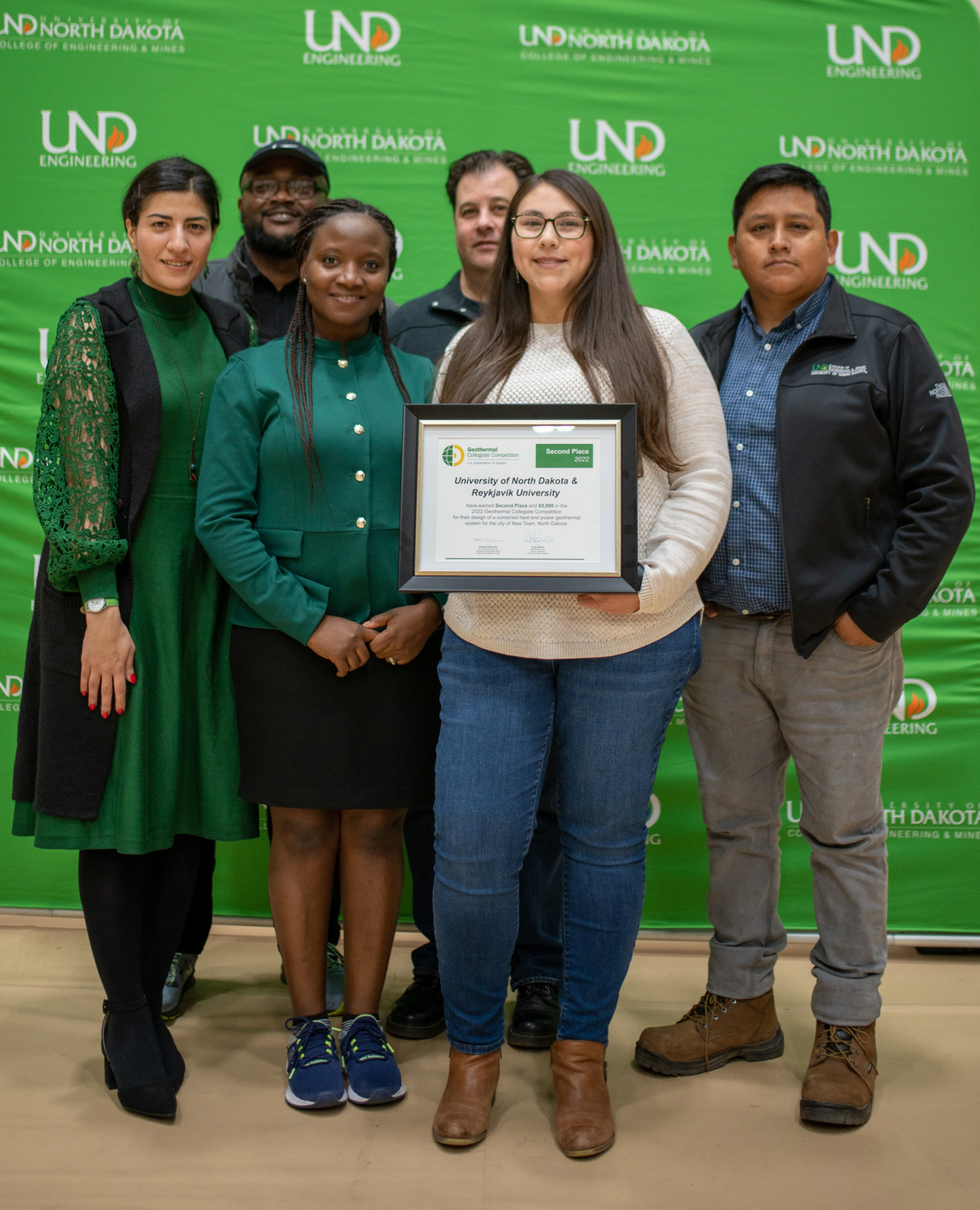On November 5, 2022, the Geothermal Vision team from the College of Engineering and Mines at the University of North Dakota (UND) and Reykjavik University celebrated their second-place win in the Geothermal Technologies Office (GTO) 2022 Geothermal...
Geothermal Technologies Office
December 7, 2022
L-R: Moones Alamooti, Nnaemeka Ngobidi, Chioma Onwumelu, Shane Namie, Jessica Eagle-Bluestone, and Jerjes Porlles from team UND Geothermal Vision pose with their GCC certificate.
On November 5, 2022, the Geothermal Vision team from the College of Engineering and Mines at the University of North Dakota (UND) and Reykjavik University celebrated their second-place win in the Geothermal Technologies Office (GTO) 2022 Geothermal Collegiate Competition (GCC) by hosting a two-part community engagement event on Tribal land. The team hosted the event in New Town, North Dakota, on the Fort Berthold Indian Reservation, home to the Mandan, Hidatsa, and Arikara Nation (MHA Nation). The event focused on raising awareness about geothermal use, including district energy generation, as well as sharing ideas and interactive dialogue with the Tribal community.
Nnaemeka Ngobidi, a Ph.D. student of Geology, said, “The Geothermal Collegiate competition is an interdisciplinary competition that brings together students from various fields to achieve a common geothermal goal. Everyone gets to learn something new in areas they know little or nothing about.”
Shane Namie, a Ph.D. candidate in geological engineering at UND, said, “Our project takes you outside your comfort zone, outside your classroom work, and applies it.”
The Geothermal Vision team garnered their second-place win for the design of a combined heat and power geothermal system for New Town. Students used pre-existing geological information from local oil and gas exploration to design a system that can heat and power an entire district, including greenhouses and aquaculture.
The team partnered with the MHA Nation on completing the project, as well as hosting the community event.
“We want to thank the MHA Nation,” said Jessica Eagle-Bluestone, a recent graduate of UND with a Master’s in Energy Systems Engineering. “We went through the Tribal council to request the proper resolutions for different aspects of the project; getting the Tribe’s consent and support was pivotal.”
In the morning, the Geothermal Vision team hosted 75 students from a local high school for a Geothermal 101 presentation and a discussion about their proposed geothermal district heating system design. The team also gifted a custom model display of geothermal uses and technologies to the MHA Nation and recognized the Nation’s involvement with a certificate of appreciation.
The afternoon’s four-hour event with community members from New Town and neighboring Mandaree, North Dakota, included a panel discussion with notable speakers from UND, the National Renewable Energy Laboratory, and the MHA Nation on the transition from oil and gas to geothermal, social licenses and community engagement, and Tribal energy independence and resilience.
Panelist Dr. Monica Mayer, a Tribal councilwoman for the MHA Nation, said, “What we go to in the future is exactly what you are doing today. You come out to the community, you talk to the people, you tell them what your ideas are, you let them know how you are going to be respectful of culture, tradition, way of life, and help us keep our land, air, and water clean and not take advantage of us. That is called meaningful Tribal consultation.”
The UND Geothermal Vision team has competed in the GCC since 2019 and achieved two first-place wins. Their winning project in the 2021 GCC, completed as a partnership between UND and Reykjavik University, focused on a design for combined heating and power geothermal systems and included researching the use of existing gas wells to generate geothermal energy for heating, agricultural use, and workforce development in Mandaree.
Jerjes Porlles, a Ph.D. candidate in Energy Engineering at UND, praised the training received through GCC and said the team is ready to win the next one.
“Everything I learned about geothermal I learned through three years of the Geothermal Collegiate Competition,” said Porlles.
Moones Alamooti, a Ph.D. student of Geophysics and M.Sc. student of Energy Engineering, added, “Working as a team truly allows you to realize your full potential and willpower.”
Keep an eye out for updates on the next Geothermal Collegiate Competition, scheduled for spring 2023. In the meantime, read our blog about another recent community event with GCC winners in Oklahoma.

